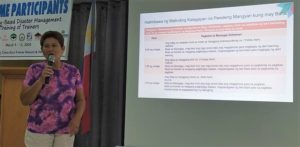 Vivian Asong, locally known as Nay Viv, was the DPC member chosen by PCDR to be trained on CBDM Training of Trainers last March 9-13, 2020, along with the EnCap 2 project staff. Nay Viv was chosen for that activity because she is an active urban poor organizer and leader under the Katilingban sang Imol sa Syudad (Urban Poor Association) or KAISOG, Inc., an organization founded in the 1980’s by the church people as a result of extreme demolition cases in Iloilo City, and currently a member of the Iloilo City Development Council and National Anti-Poverty-Commission (NAPC).
Vivian Asong, locally known as Nay Viv, was the DPC member chosen by PCDR to be trained on CBDM Training of Trainers last March 9-13, 2020, along with the EnCap 2 project staff. Nay Viv was chosen for that activity because she is an active urban poor organizer and leader under the Katilingban sang Imol sa Syudad (Urban Poor Association) or KAISOG, Inc., an organization founded in the 1980’s by the church people as a result of extreme demolition cases in Iloilo City, and currently a member of the Iloilo City Development Council and National Anti-Poverty-Commission (NAPC).
Before joining and become the chairperson of KAISOG, Nay Viv was an ambulant vendor. As an urban poor herself, she knows the economic, political, and disaster-related conditions of different urban poor communities in Iloilo City. She sees how vulnerable these communities are to different hazards like fire, flood, and displacement due to demolition. Her realizations and experiences strengthened her commitment and drive to work for disaster risk reduction in the community level that is why she was also chosen by PCDR for this activity.
To Nay Viv, urban poor is one of the sectors severely affected by COVID-19 pandemic, since majority of the people are relying on daily wage earnings. During the quarantine period, jeepney drivers were not allowed to ply their route, small vendors were not allowed to sell or open their establishments, and workers were left jobless due to the permanent closing of several establishments. Currently, even though restrictions are gradually being lifted as the City approaches the so called “New Normal”, the urban poor community has not yet moved on from the impact of the lockdown.
As a DPC head who was able to attend the CBDM Training of Trainers, Nay Viv sees the importance of planning as a disaster preparedness activity, and realized that there is a need to invest on disaster preparedness, which is currently lacking in some communities in Iloilo City. That when we prepare, it is not only about a matter of planning how to respond to different disasters but to involve the community members all through out the process until the implementation of such plans. So, as soon as she arrived from the said training, their organization planned out how to combat COVID-19. They conducted information drive in different urban poor communities and distributed COVID-19 brochures made by PCDR. They also conducted community health trainings, formed community health teams, and conducted community feeding programs.
Other than COVID-19, based on their seasonal calendar, Nay Viv said that the approaching rainy season is an indication of the approaching season of mosquito-induced diseases such as dengue. Last year, according to the City Health Department, dengue cases in Iloilo City grew by more than 400 percent compared to the cases recorded in 2018. This makes Nay Viv and the whole community worried of the possible recurrence of dengue outbreak, which they have encountered last year.
Currently, KAISOG, is in the forefront of conducting DRR activities not only for COVID-19 but also to prevent the recurrence of dengue outbreak in Iloilo City.They are now conducting community clean-up drives, maintaining the conduct of community health trainings, and are planning to make anti-mosquito repellent, which they already started last year. Such activities are being conducted through FIGHT COVID – 19 PEOPLE’S ALLIANCE, a broad alliance of health practitioners, youth and women sector, church people, and so on. This goes to show that people in the communities are participating with different sectors to fight and combat COVID-19. Last year, Anti-Dengue Campaign led by KAISOG was able to mobilize 10 Barangays in a weekly synchronized clean-up drives, and was able to conduct lectures, together with the health sector, on Dengue (see attachment).
To Nay Viv, “Makabulig gid kung maghimo man kita sang kapareho sini nga training sa lokal para makabalo ang tagsa-tagsa ka komunidad mag plano antes pa lang mag-abot ang kalamidad.” (It would be very helpful if similar training will be given to communities so they would know how to plan before a disaster strikes). Lastly, Nay Viv said, “To increase the capacity of the people is to increase their learnings.” There should be massive education campaigns and most of all, there should be economic support for them so that when disaster strikes, the people can easily recover.
